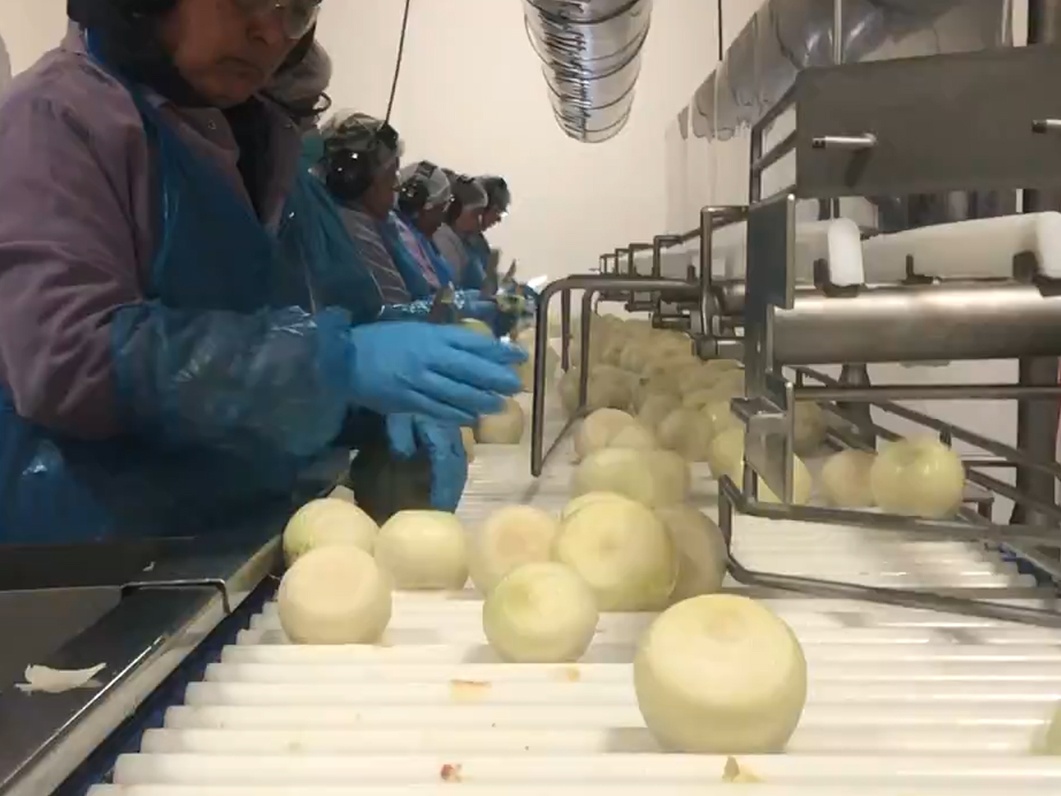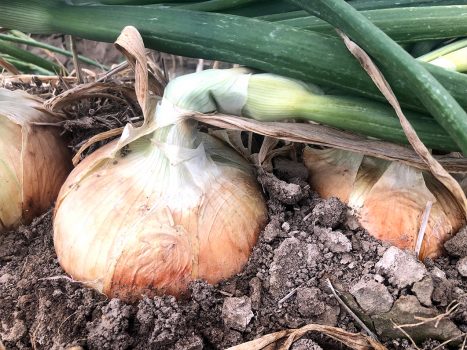With 2019’s PMA Foodservice Conference and Expo bringing out the industry’s best and brightest in Monterey, CA, this week, a true standout at the show is Gills Onions at Booth 419.
VP of Sales and Marketing Megan Jacobsen took time from her very busy schedule to share with OnionBusiness this year’s message, which looks at several foodservice conveniences and services Gills provides while maintaining a high degree of sustainability in its operations.
In fact, the Oxnard, CA, company is celebrating a decade of sustainability initiatives and is now adding solar energy to its portfolio.
“REC Solar, a division of Duke Energy Renewables and one of the nation’s leading suppliers of on-site and off-site renewable energy solutions, developed the new 472 KW(dc) solar roof array to make the most of Gills Onions’ Oxnard-based processing facility,” Gills said in a recent release. The addition of solar enhances the company’s green efforts and environmental stewardship.
At the same time, the company is focusing on how to best serve its customers, and Megan said in a play on words, “A whole peeled onion program makes cents. The cost of doing business is rising at an extremely fast pace for our foodservice industry, and that will not be changing.” Megan explained, “Not only does it cost money to whole peel a sack of onions in back of a kitchen, but also finding the labor to do it is becoming harder. Our message at PMA Foodservice is consistent with what we sell daily – no labor and no waste, just usable product.”
Moreover, she said, “Gills’ Whole Peeled Onion Program provides a consistently high quality product, where sack onions can vary in quality, price and yield, and it takes out the time consuming kitchen labor while reduce the opportunity for knife injuries and cross contamination in the kitchen.” But that’s not all. “Transportation is also a major factor. Logistically, the industry is transporting more than 30 percent onion waste throughout the country.”
Stats are proof of the pudding. “There are 400-plus loads of sack onions shipped and consumed each day in the United States. One in every three that a foodservice customer pays for will be discarded – 30 percent average waste in a sack of onions; more than 50 percent when you chop, sliver and dice,” she continued.
Consider that there are 850 sacks of onions on a truck, or 42,500 pounds.
“With Gills Onions whole peeled 30-pound cases, you can load 1,400 cases on a truck. That is 42,000 pounds, and again, no waste, just 100 percent usable product,” Megan said. “Transportation should absolutely be a consideration when having the conversation about buying onions.”
Gills Onions is, she said, “the best at what we do. We bring peace of mind to those restaurants, schools and hospital cafeterias and catering operations that are looking for solutions that allow them to maximize the backend of their kitchens and bottom lines.”
And the company also provides solutions “to some of the most significant hurdles our foodservice customers face – labor, food safety, product waste.” Importantly, Megan said, “We accomplish these things while being at the forefront of sustainability leadership and the various initiatives positively impact not just our business, but our customers, the industry and the environment. Our foodservice customers profit from a greener supply chain, increased transparency and from partnering with suppliers who share the same values and commitment to sustainability.”
With the addition of the 472 KW (dc) solar roof emissions-free generation, the facility’s electricity “will produce 13,791 fewer metric tons of emissions, equating to the same carbon sequestered by 16,231 forest acres for a year,” the release said.
Steve Gill, owner of Gills Onions, said, “At Gills Onions, it is our goal to provide the highest-quality onion products with the lowest environmental impact. We are pleased to partner with REC Solar on our latest initiative. We’re continually evolving our sustainability program to positively impact our environment.”
The solar program is part of a portfolio that includes projects that help address the reduction of waste, emissions and carbon, water conservation, efficient land usage and conservation, environmentally preferable and safe packaging choices and quality of life for our farmers, employees and communities, the release said.
Steve Gill added, “We established sustainability priorities to ensure the greatest impact across our operation. We face many challenges in our business, including minimizing our environmental footprint while also ensuring the safety and highest quality of our products. We are moving forward with innovation and great enthusiasm as we explore ways to do so. We are maintaining this focus even as we continue to navigate this challenging economic and regulatory environment. Our vision is for the long term and so is our commitment.”
Now take a look at Gills Onions processing in Oxnard, California. Filming is courtesy of Robert Bell with Western Onion Sales, Inc.


